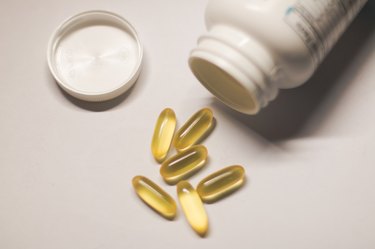
Fish oil is an animal source of DHA and EPA omega-3 polyunsaturated fats. It is found most abundantly in fatty fish such as salmon and tuna, or as pill or oil supplement. Fish oil is widely known and used in the management of cardiovascular disease. However, studies have revealed it may also be used for many other brain functions, including the management of mood disorders and depression.
Omega-3s Role in the Body
Video of the Day
Omega-3s are essential fats. The body cannot produce them on its own. Food sources of Omega-3 include fatty fish such as salmon, tuna and mackerel; walnuts; and flaxseed and canola oil. Omega-3 acids are also widely available in supplement form as either fish oil or flaxseed oil. The National Institute of Health identifies a main function of omega-3 as helping reduce pain and swelling and to improve brain and nerve functions.
Video of the Day
Fish Oil and Depression —The Evidence
There is debate among researchers that fish oil is effective in treating depression. Dr. Daniel Hall-Flavin of the Mayo Clinic believes that fish oil can be used to treat symptoms of depression and anxiety. In a 2009 issue of "Neurosignals," a study suggested that fish oil may treat symptoms of depression along with medication. A review in "Age and Nutrition" states there is a inverse relationship between the incidence of seasonal depression and the amount of Omega-3's present in the an individual's blood plasma. However, Dr. Michael Maes, in "Neuroendocrinology Letters," concludes that DHA Omega-3 in fish oil can interfere with the function of regular anti-depressant drugs, but EPA Omega-3 does not intere with the function of antidepressants.
There are other over-the-counter depression meds that you can take on their own or in conjunction with antidepressants, too. Talk to your doctor if you're unsure what's best for you.
Appropriate Dosage
The appropriate dosage for treating depression and anxiety is inconclusive in research. According to the National Institute of Health, the dose for fish oil when treating depression is 9.3 g or 9,300 mg per day. This is far beyond the recommended dose of 1 to 4 g for cardiovascular disease. One study found that doses between 200 mg and 9 g is effective for treatment. However, Dr. Hall-Flavin recommends just 100 to 300 mg daily for treatment of depression and anxiety, although he stated that more research is needed to determine ideal doses.
Medication Interaction
High doses of Omega-3 fatty acids can have potential risks and interactions with medication. Do not begin a fish oil regimen without consulting a physician first. According to the NIH, there is a risk of bleeding from consuming more than 3 g of Omega-3 per day. Fish oil also may increase the effects of high blood pressure medications and lower blood pressure to severe levels. Birth control and Orlistat medications for weight loss may inhibit absorption of fish oil.
Related Reading
Omega-3 is an essential fatty acid that promotes cardiovascular health. High levels of the bad cholesterol -- low-density lipoproteins and triglycerides -- and low levels of the good cholesterol high-density lipoproteins can lead to cardiovascular disease. Omega-3 can help lower the blood content of the bad cholesterol and raise the good cholesterol. More recently, omega-3 has received attention for its possible positive effects on mood-disorders such as major depression, generalized anxiety disorder, panic disorder and bipolar disorder.
Omega-3 Fatty Acids
Omega-3 is found in high amounts in salmon, tuna, sardines, wild game and walnuts. The fat is "essential" because it must be supplied through the food, as the body cannot synthesize it. The other essential fatty acid is omega-6, found in corn, dairy products and soybean oil. Omega-3 and omega-6 have complementary functions. Omega-3 decreases inflammation and is an important component of cell membranes and nerve synapses. Omega-6 increases inflammation when there are foreign invaders in the body.
Omega-3 and Depression
As reported in Science Daily, a 2001 study completed in Finland showed that infrequent consumption of fish and depression were significantly correlated. A Dutch study published in 2003 showed that people who were depressed and those without depression had significantly different intakes of omega-3 fatty acids. In a newer study published in the June 2010 issue of "Journal of Clinical Psychiatry," it was found that omega-3 supplements were as efficient as conventional antidepressant medications in the treatment of major depression.
Serotonin in Anxiety and Depression
According to Joseph R. Hibbeln from the National Institute on Alcohol Abuse and Alcoholism, omega-3 can affect the functionality of the neurotransmitter serotonin, which plays a critical role in both depression and anxiety. Depression and anxiety have similar chemical profiles. Both disorders are characterized by low brain levels of serotonin. The most widely used antidepressant drugs, selective serotonin re-intake inhibitors, or SSRIs, work by slowing the speed with which serotonin outside the neurons is broken down and re-absorbed into the cells. These drugs are also commonly prescribed for anxiety disorders. If omega-3 fatty acids can help prevent depression by increasing the functionality of serotonin, it can also help prevent anxiety.
Synaptic Function
The 2011 study of the lack of dietary omega-3 suggests that it may help prevent mood disorders. Omega-3 is essential to the optimal function of two brain regions involved in motivation and emotional regulation -- the prefrontal cortex and the nucleus accumbens. As a lack of motivation is more significant in depression than in anxiety, suggesting that omega-3 may have a greater positive effect on depression than anxiety.
- National Library of Health: Fish Oil
- "Neurosignals"; Biological Mechanism of Antidepressant Effect of Omega-3 Fatty Acids: How Does Fish Oil Act as 'Mind-Body Interface'?; Kuan-Pin Su; February 2009
- "Neuroendocrinology Letters"; Why fish oils may not always be adequate treatments for depression or other inflammatory illnesses: docosahexaenoic acid, an omega-3 polyunsaturated fatty acid, induces a Th-1-like immune response; Michael Maes; November 2007
- "Age and Nutrition"; Dietary omega-3 Fatty acids and psychiatry: mood, behaviour, stress, depression, dementia and aging; JM Bourrne; April 2005.